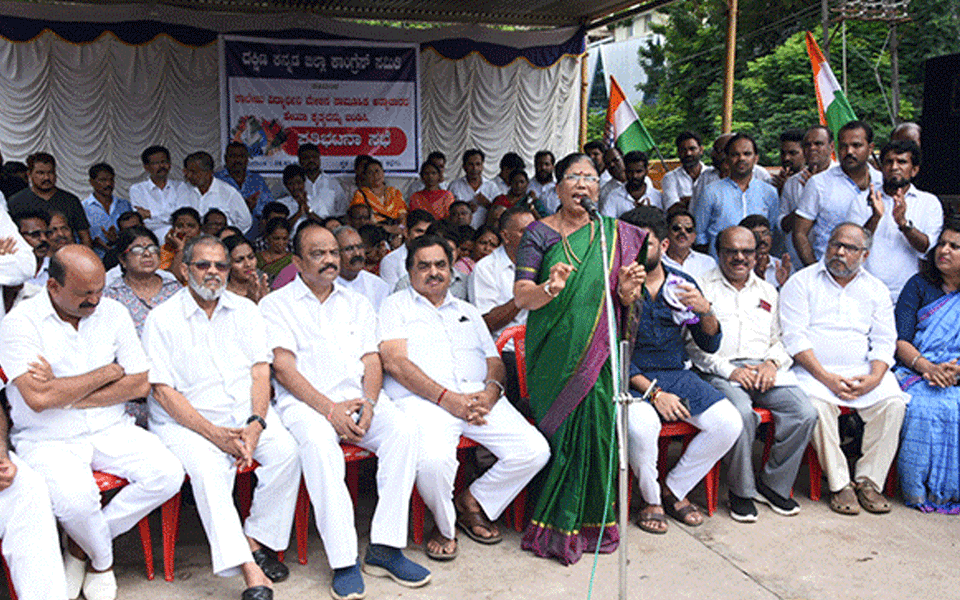Mangaluru: Former MLA and Congress leader Shakuntala Shetty on Monday demanded laws similar to Saudi Arabia for rape cases to be implemented in India to curb crime against women and young girls.
Shakuntala was speaking at a meet outside Dakshina Kannada Deputy Commissioner’s office in the city organised by Dakshina Kannada Congress Committee demanding justice to the girl who was gang-raped in a car in Puttur, video of which had gone viral earlier this month.
“20 year ago, Soumya Bhatt was killed by Muslim youth in Puttur. Condemning the incident the BJP activists had set Puttur on fire and had triggered riots then. Even after that such incidents continued to take place across the District. When a woman was stabbed by a youth near Derlakatte, MP Shobha Karandlaje had blamed District In-Charge Minister U T Khader. Now it is the BJP Government at the centre, they should introduce laws similar to Saudi Arabia which publicly hangs rapists. It will provide justice to the women of this country” Shankuntala demanded.
She further added “Fortunately this time the accused in this case are not from minority community. Otherwise it would have disturbed the peace and law and order of the District”.
MLC and DCC President Harish Kumar, B Ramanath Rai, former MLA Mohiddin Bava, Ibrahim Kodijal, Shahul Hameed K K, Mithun Rai, Shashidhar Hegde, Mohammed Monu and others were present at the meet.





Let the Truth be known. If you read VB and like VB, please be a VB Supporter and Help us deliver the Truth to one and all.
Bengaluru (PTI): Karnataka Chief Minister Siddaramaiah on Friday said Artificial Intelligence must remain a tool to enhance human creativity and not replace artists, stressing ethical use, protection of intellectual property and fair compensation in the AVGC-XR sector.
He also called upon industry leaders to invest in original content, educational institutions to modernise curricula, young creators to dream fearlessly and global partners to collaborate with Karnataka.
Speaking after inaugurating the seventh edition of Bengaluru GAFX- Games, Animation and Visual Effects Conference, themed "Evolution Reloaded", here, he said Karnataka's commitment to the AVGC-XR sector was not recent or reactive, asserting, "We have been pioneers."
Siddaramaiah recalled that in 2017, Karnataka became the first state in India to implement a dedicated (Animation, Visual Effects, Gaming, Comics) AVGC policy.
"That decision was driven by foresight, recognising that content creation would become as powerful as code creation," he said.
"Today, GAFX represents the next great frontier. The Games, Animation and Visual Effects sector is no longer a small creative industry. In the era of digital revolution, immersive media, streaming platforms, e-sports, and extended reality, GAFX is shaping how humanity experiences stories, culture, education and even governance," he said.
The CM said the government is implementing its third AVGC-XR Policy for 2024-2029, reflecting sustained commitment to the sector.
"Our AVGC-XR Policy has provided incentives, infrastructure support, skill-building initiatives, incubation systems, and institutional collaboration to nurture this ecosystem," he said.
On Artificial Intelligence, Siddaramaiah said it is transforming content pipelines and enhancing productivity, but cautioned that it must remain a tool and not a substitute for human imagination.
"Technology should amplify human potential, not erase it. The soul of storytelling is human emotion, something no algorithm can replicate in its fullness," he said.
Calling for ethical usage of AI, he said, "Respect for intellectual property, data privacy, fair compensation, and skill upgradation must be central."
Emphasising expansion beyond Bengaluru, Siddaramaiah said digital creative clusters are being promoted in Mysuru, Mangaluru, Hubballi-Dharwad, Kalaburagi and other emerging cities.
"We want the next great game designer or VFX innovator to emerge not only from the capital, but from every district of Karnataka," he said.
The CM said Karnataka should be known not only as the Silicon Valley of India but also as the "Creative Capital" of the Digital World.
Siddaramaiah said the state is reimagining tourism through Augmented Reality and integrating immersive AVGC-XR technologies into education, medical training through simulation, and digital preservation of cultural heritage.
He said the sector is both an economic and civilisational opportunity, empowering youth and enabling rural talent to create global content.
With the potential to create 20 lakh jobs over the next five years, the sector would generate employment across design, coding, storytelling, music, motion capture, AI modelling and production management, he said.
Calling for structured skill development, the CM said educational institutions must integrate AVGC-XR skills into mainstream education.
Outlining five strategic priorities, Siddaramaiah said the state would focus on building a future-ready talent pipeline, strengthening infrastructure, supporting startups and original intellectual property, expanding opportunities beyond Bengaluru, and building global partnerships.
While encouraging innovation in animation and gaming, he said, "We must also uphold responsibility, promoting ethical game design that avoids glorifying violence, safeguards the mental well-being of children, and encourages creativity, critical thinking and positive social values."
The chief minister assured that the government is committed to policies that protect human creators and users while empowering them with new tools.
"We will ensure that progress is inclusive. The digital revolution must not widen inequality; it must democratise opportunity," he said.




